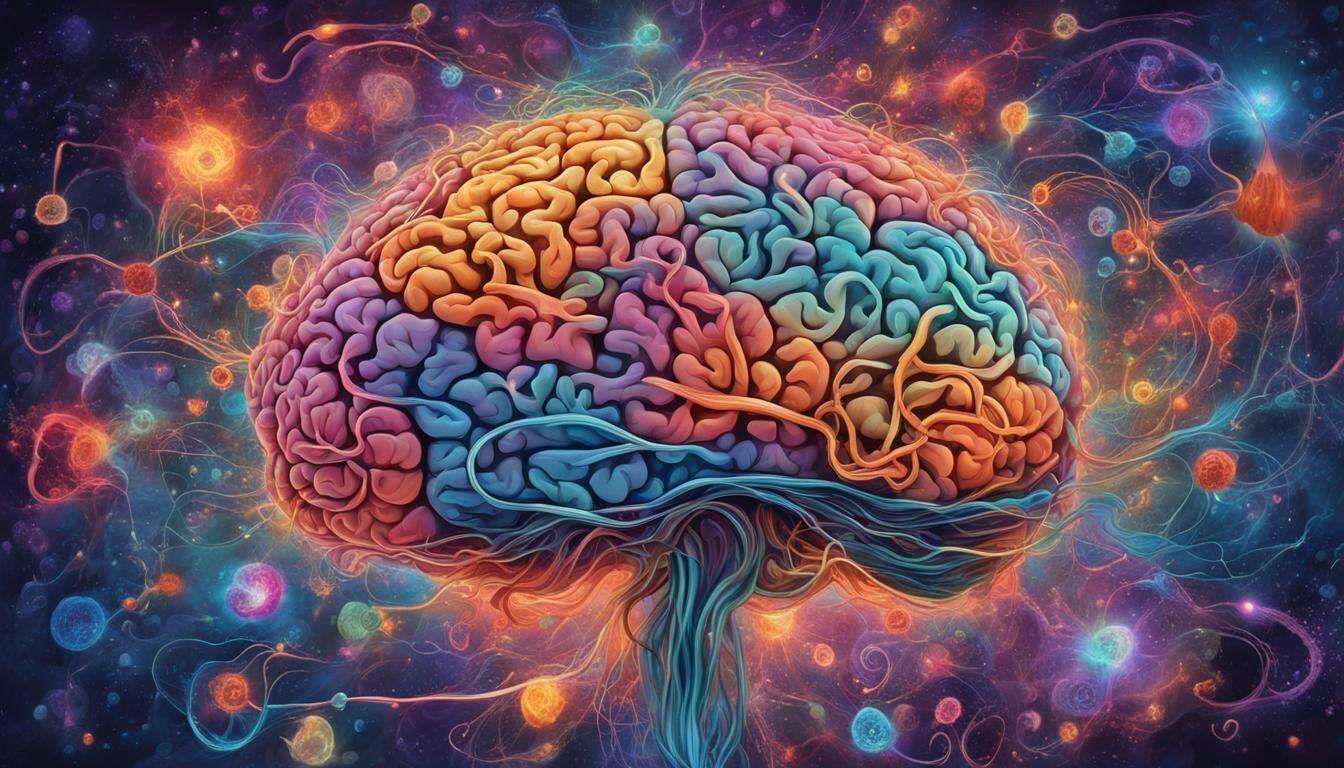Uncover What Chemical Causes Lucid Dreams: In-depth Insight
Some of our posts on Dreamtold.com contain affiliate links. If you click on an affiliate link and make a purchase, we may receive a commission. Clicking on an affiliate link that earns a commission does NOT result in additional charges or costs you extra. Earnings from affiliate links help keep this website running. See our full affiliate disclosure here.
Have you ever had a dream where you were fully aware you were dreaming? These dreams, known as lucid dreams, can be incredibly vivid and immersive, and they have captured the imagination of scientists and dreamers alike for decades. But what causes these fascinating experiences?
It turns out that chemicals in the brain play a crucial role in inducing and enhancing lucid dreams. Understanding the role of these chemicals can provide insights into the mechanisms of dreaming and potentially unlock new avenues for exploring the mysteries of the unconscious mind.
Key Takeaways:
- Lucid dreams are dreams where the dreamer is aware they are dreaming.
- Chemicals in the brain play a crucial role in inducing and enhancing lucid dreams.
- Understanding the role of these chemicals can provide insights into the mechanisms of dreaming and potentially unlock new avenues for exploring the mysteries of the unconscious mind.
Understanding Lucid Dreaming: A Gateway to Unconscious Exploration
Lucid dreaming refers to the state in which a person becomes consciously aware that they are dreaming, and can sometimes exert control over the dream environment and narrative. The experience can be truly magical, with endless possibilities for exploration and experimentation within the dream world.
While the exact mechanisms of lucid dreaming are not fully understood, research suggests that certain neurotransmitters play a critical role in the process. Neurotransmitters are chemical messengers in the brain that facilitate communication between neurons. In the case of lucid dreaming, neurotransmitters like acetylcholine, serotonin, and dopamine are thought to influence the brain’s sleep-wake cycle and contribute to the occurrence of lucid dreams.
Various methods can be used to induce or enhance lucid dreaming, including the use of certain chemicals. For example, some supplements or nootropics, such as galantamine or choline, can promote the production of acetylcholine, which may increase the likelihood of lucid dreaming. Additionally, substances like nicotine or caffeine can indirectly influence lucid dreams by altering sleep patterns.
Inducing Lucid Dreams with Chemicals
One of the most well-known chemicals used to induce lucid dreaming is the plant-based compound known as Calea zacatechichi, or “dream herb.” This herb has been used for centuries by indigenous peoples in Mexico to enhance dream experiences, and some studies have suggested that it may increase the frequency and intensity of lucid dreams.
Another way to enhance lucid dreaming through chemicals is to use psychoactive substances such as psychedelics or entheogens. These substances can produce altered states of consciousness that can be conducive to lucid dreaming, but they should only be used with caution and in a responsible manner. Proper knowledge and preparation are essential to ensure a safe and positive experience.
In conclusion, understanding the role of neurotransmitters and chemicals in lucid dreaming can be an essential step in taking control of one’s own dream experiences. While proper care should be taken when using chemicals to induce or enhance lucid dreams, the potential benefits of this practice are vast. By exploring the possibilities of the dream world, we have the potential to tap into deeper levels of creativity, introspection, and personal growth.
The Power of Brain Chemicals: Unraveling the Neurotransmitter Connection
Lucid dreaming is a fascinating phenomenon that is made possible by a complex interplay of brain chemicals. At the core of this process are neurotransmitters, which are chemicals that help to transmit signals between neurons in the brain. Three neurotransmitters in particular have been linked to lucid dreaming: acetylcholine, serotonin, and dopamine.
Acetylcholine is a key neurotransmitter that is involved in many different brain functions, including REM sleep and learning. Studies have shown that levels of acetylcholine are elevated during lucid dreaming, which may be why people are able to become aware that they are dreaming. Serotonin is another neurotransmitter that has been linked to lucid dreaming. It is involved in regulating mood, sleep, and other bodily functions. Studies have shown that increased levels of serotonin in the brain may make lucid dreaming more likely to occur. Finally, dopamine is a neurotransmitter that is involved in motivation, reward, and pleasure. Some researchers believe that elevated levels of dopamine may play a role in creating the vivid and intense dreamscapes that occur during lucid dreaming.
Overall, the relationship between brain chemicals and lucid dreaming is complex and multifaceted. While the exact mechanisms are not yet fully understood, it is clear that neurotransmitters play a crucial role in facilitating this unique and exciting form of dreaming.
Natural Chemicals for Lucid Dreaming: Tapping Into Nature’s Pharmacy
While chemicals can be synthesized in labs to induce and enhance lucid dreaming, there are also natural substances that can potentially offer the same benefits. Many of these substances are derived from plants and herbs, which contain compounds that affect the brain’s chemistry and promote lucidity during dreams.
One such plant is mugwort, commonly used in traditional Chinese medicine for its psychoactive properties. Mugwort can be consumed as a tea or burned as incense to induce vivid and lucid dreams. Galantamine, derived from the snowdrop plant, has also been found to enhance dream recall and lucidity when taken as a supplement.
Calea zacatechichi, known as the “dream herb”, has been used by indigenous people in Mexico for centuries to induce lucid dreams. This herb is believed to enhance the brain’s production of acetylcholine, a neurotransmitter associated with dreaming and memory.
It is important to note that the effects of these natural substances may vary from person to person and should be used with caution. Always consult with a healthcare professional before taking any new supplements or herbs, particularly if you have underlying medical conditions or are taking prescription medications.
Safe and Informed Use of Natural Chemicals
As with any substance used for lucid dream enhancement, it is important to practice safe and responsible usage when utilizing natural chemicals. Keep in mind that these substances may interact with other medications or affect those with certain health conditions.
It is also crucial to be well-informed about the potential risks and benefits of using natural chemicals for lucid dreaming. Educate yourself on the properties and effects of each substance, including proper dosage, potential side effects, and the best methods of consumption.
Ultimately, the use of natural chemicals for lucid dreaming can be a powerful tool for unlocking the potential of the dream state. By tapping into nature’s pharmacy, we can explore new realms of consciousness and gain a deeper understanding of ourselves and the world around us.
Exploring Psychoactive Substances: A Deeper Dive into Altered States
Lucid dreaming is a phenomenon that has fascinated people for centuries, and many have sought ways to enhance their dream experiences. One approach that some have explored is the use of psychoactive substances for lucid dreaming. While these substances can provide remarkable experiences, it is essential to be aware of the potential risks and approach their use with caution and respect.
Psychoactive substances are compounds that affect the brain’s chemistry and alter perception, mood, and consciousness. Many have been used for centuries in spiritual and cultural practices to induce altered states of consciousness and facilitate introspection and healing.
When it comes to lucid dreaming, some psychoactive substances have been explored for their potential to enhance the dream experience. Examples include psychedelics such as LSD, psilocybin, and DMT, dissociatives such as ketamine and DXM, and entheogens such as ayahuasca and peyote.
Research on the use of these substances for lucid dreaming is limited, and there are potential risks and adverse effects. The effects of these substances on sleep patterns, for example, can be unpredictable, leading to disrupted sleep and reduced REM sleep, which is essential for dreaming. Additionally, these substances can alter perception and mood in unexpected ways, leading to challenging or even traumatic experiences.
Given these risks, it is crucial to approach the use of psychoactive substances for lucid dreaming with caution and informed decision-making. If you choose to explore this approach, it is essential to research the substance thoroughly and understand its effects, dosage, and potential risks. It is also important to consider the setting and mindset in which you use these substances, as well as any potential interactions with other medications or health conditions.
Ultimately, the use of psychoactive substances for lucid dreaming is a personal decision that requires careful consideration and respect for the substance and its potential effects. With responsible use and informed decision-making, these substances can provide remarkable and transformative experiences in the realm of lucid dreaming.
Enhancing Lucid Dreams with Chemicals: Methods and Techniques
Lucid dreaming can be an exhilarating experience, and many people are interested in ways to enhance and extend their dreams. Luckily, there are a variety of methods and techniques that can be used to increase the frequency and intensity of lucid dreams. Chemicals can play a key role in this process, whether in the form of supplements or natural compounds.
Supplements and Nootropics
One of the most common ways to enhance lucid dreaming with chemicals is through the use of supplements or nootropics. These substances can help to promote cognitive function, memory retention, and mental clarity, all of which can be useful for inducing lucid dreams. Some popular options include:
| Supplement | Benefits |
|---|---|
| Galantamine | Increases levels of acetylcholine, a neurotransmitter involved in dreaming |
| Melatonin | Supports healthy sleep patterns and can increase the likelihood of lucid dreaming |
| Bacopa Monnieri | Improves memory function and cognitive ability, which can enhance dream recall and clarity |
It’s worth noting that not all supplements and nootropics are safe or effective, and some may interact poorly with other medications or health conditions. Always consult with a healthcare provider before starting any new supplement regime.
Natural Compounds
In addition to supplements, there are a variety of natural compounds that can potentially enhance lucid dreaming. Many of these are found in plants and herbs with a history of use in traditional medicine. Some examples of natural compounds worth exploring include:
- Mugwort: Used for centuries to promote vivid dreams and improve dream recall
- Calea Zacatechichi: A type of Mexican plant also known as “dream herb” for its potential to enhance and prolong dreams
- Valerian Root: Often used as a natural sleep aid, which can increase the likelihood of lucid dreams
Again, it’s important to use caution when experimenting with natural compounds, as some may have unwanted side effects or interactions with other substances.
Dream Journaling and Reality Checks
While chemicals can certainly play a role in inducing lucid dreams, there are also a number of non-chemical techniques that can be used to prime the mind for lucidity during sleep. One such technique is dream journaling, which involves recording dreams in a journal immediately upon waking. This can help to improve dream recall and increase awareness of recurring themes and symbols.
Another technique is reality checking, which involves regularly asking oneself if one is dreaming throughout the day. This habit can carry over into dreams, making it more likely that one will notice when one is dreaming and become lucid. Some reality checks involve looking at a clock or reading a sentence multiple times to see if the text changes or checking if one can breathe with one’s nose plugged.
By combining these non-chemical techniques with supplements or natural compounds, it may be possible to increase the frequency and intensity of lucid dreams.
The Lucid Dreaming Experience: An Unforgettable Adventure
Lucid dreaming is an extraordinary experience that can open doors to new levels of self-awareness, creativity, and personal growth. When chemicals are involved, these experiences can become even more vivid and memorable.
The chemical makeup of the brain during lucid dreaming is complex and varies from person to person. However, research has shown that certain chemicals, such as acetylcholine, serotonin, and dopamine, have a significant impact on the frequency and intensity of lucid dreams.
During a lucid dream, the senses can become heightened, and emotions can feel more intense. Colors and sounds may appear brighter and more vibrant, and the dreamer has the ability to control their actions and surroundings. All of these experiences are influenced by the chemical activity in the brain, which can be enhanced through deliberate practices and the use of supplements.
Of course, not all lucid dreams involve chemicals, nor do they require them. However, for those who are interested in exploring the potential of lucid dreaming, chemicals can be a valuable tool for enhancing the experience.
Whether you choose to use natural substances or seek out psychoactive substances, it is essential to approach the experience with caution and respect. Responsible use, combined with education and preparation, can lead to a safe and meaningful experience.
Overall, the lucid dreaming experience is a remarkable and unforgettable adventure. By understanding the role of chemicals in lucid dreaming, we can unlock the full potential of this unique state of consciousness.
Conclusion
Lucid dreaming is a fascinating realm of dreaming that offers us the opportunity to explore our unconscious mind and tap into our innermost thoughts and desires. The role of chemicals in inducing and enhancing lucid dreams cannot be ignored, given their influence on our brain chemistry and sleep-wake cycle.
Understanding the science behind lucid dreaming and the role of chemicals can help us in our quest to experience this incredible phenomenon. From natural substances to psychoactive compounds, there are many ways to enhance our ability to have lucid dreams.
However, it is important to approach the use of chemicals with caution and responsibility. Always consult with a healthcare professional before taking any supplements or using psychoactive substances. Remember that the quality of our lucid dreams is not solely dependent on the use of chemicals, but also on our mindset and approach to dreaming.
In conclusion, lucid dreaming holds enormous potential for personal growth, creative expression, and introspection. By understanding the role of chemicals in lucid dreaming and using them responsibly, we can unlock the incredible power of our unconscious mind and embark on an unforgettable adventure.
FAQ
Q: What is lucid dreaming?
A: Lucid dreaming is a state of dreaming where the dreamer is aware that they are dreaming. In this state, the dreamer can often control or manipulate the dream environment and their actions within the dream.
Q: What chemicals are involved in lucid dreaming?
A: The chemicals involved in lucid dreaming include neurotransmitters such as acetylcholine, serotonin, and dopamine. These chemicals play a role in regulating the sleep-wake cycle and facilitating the conditions for lucid dreaming.
Q: Can chemicals be used to induce lucid dreams?
A: Yes, certain chemicals can be used to induce lucid dreams. Examples of these chemicals include natural substances like mugwort, galantamine, and Calea zacatechichi, as well as psychoactive substances like psychedelics, dissociatives, and entheogens. However, it is important to use these substances responsibly and with proper knowledge of their effects.
Q: How can I enhance my lucid dreams with chemicals?
A: There are various methods and techniques for enhancing lucid dreams using chemicals. These include practices like dream journaling, reality checks, and the use of supplements or nootropics that support lucid dreaming. It is crucial to approach these methods safely and effectively.
Q: What can I expect from the lucid dreaming experience?
A: The lucid dreaming experience can bring about a range of emotions, sensations, and creative opportunities. It can feel incredibly vivid and immersive, allowing individuals to explore their subconscious and engage in unique experiences that are not possible in waking life.

Hi, I’m Cal Hewitt, the founder of Dream Told. After battling insomnia for over 30 years, I’ve dedicated myself to helping others find natural, practical solutions for better sleep. Through extensive research and personal experience, I share insights on how to improve your sleep quality, from creating the right environment to using external tools like binaural audio. My goal is to educate, inspire, and provide real solutions for anyone looking to get more restful sleep. Explore more about my journey and how Dream Told can help you by visiting my full story below.




